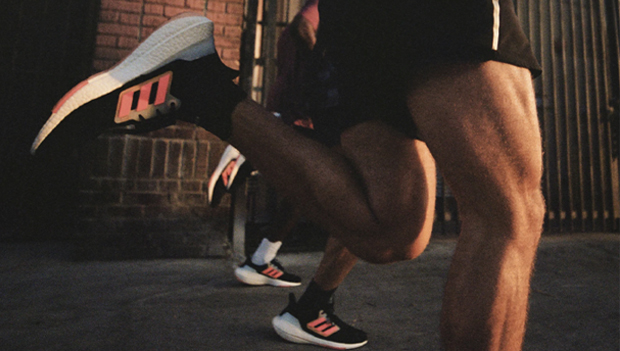
When searching through the best running shoes for men, it's likely more than just a practical matter. Buying a new pair of men's running shoes is often part of declaring a commitment: whether that’s taking your first steps toward becoming a runner or starting a new training plan for a 10k or half-marathon that requires shoes tuned for high-mileage. Buying a pair of great running shoes is a commitment to running in itself.
To get the maximum return on your investment, you want shoes that fit you, your goals, and the surfaces you run on. If that sounds overwhelming, we’ve got you covered. Whether you have high-arches, flat feet, or just want a quality running shoe fitted for men, our list of the 7 best running shoes for men has a little something for every runner.
Why Trust Us?
ACTIVE.com's editorial team relies on the knowledge and experience of fitness and wellness experts including competitive athletes, coaches, physical therapists, nutritionists, and certified trainers. This helps us ensure the products we feature are of the highest standard. Collectively, the team has spent countless hours researching equipment, gear, and recovery tools in order to create the most accurate, authentic content for our readers. Customer satisfaction is also a key part of our review process, which is why we only feature products that are highly rated.
The Best Running Shoes for Men - Our Top Picks
By clicking on the product links in this article, we may receive a commission fee at no cost to you, the reader. Sponsorships and affiliate commissions help support our research so we can help you find the best products. Read our full affiliate disclosure here.
- Best Overall Running Shoes for Men: Nike Air Zoom Pegasus
- Best Cushioned Running Shoes for Men: Hoka Bondi 8
- Best Men's Road Running Shoes: ON Cloudrunner
- Best Running Shoes for Heavy Men: adidas Ultraboost 22
- Best Men's Trail Running Shoes: Nike Wildhorse 7
- Best Running Shoes for Men with Wide Feet: Brooks Ghost 14
- Best Running Shoes for Men with Flat Feet: Hoka Tecton x
Best Overall Running Shoes for Men - Nike Air Zoom Pegasus
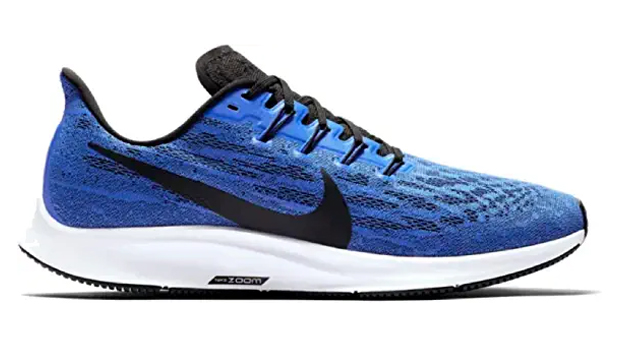
SPECS
- Best for: Beginner and intermediate runners
- Weight: 9.6 oz.
- Materials: Flywire cables intertwined with breathable mesh upper
- Cushioning: Full-length air cushion embedded in EVA foam
- Heel-to-toe drop: 10mm
Anyone who has worked at a technical running shoe store (like myself) has probably sold countless pairs of the Nike Air Pegasus, now in its 36th iteration. It's always been a tremendous buy for the price and our pick for the overall best running shoe for men. The Air Zoom unit runs the full length of the shoe, enhancing shock absorption both in the heel and the forefoot.
The Nike Air Pegasus is meant to strike a balance between cushioning and stability, so for those starting out who are unsure of what their running shoe needs are, it's a smart place to start.
What We Like
- Trademark Nike cushioning the full length of the shoe
- Lacing system enables a snug fit
- Budget-friendly
What We Don't Like
- Higher-mileage runners and heavier runners might want more overall bulk in the midsole
- Not as responsive as higher-end Nike models
Best Cushioned Running Shoes for Men - Hoka Bondi 8
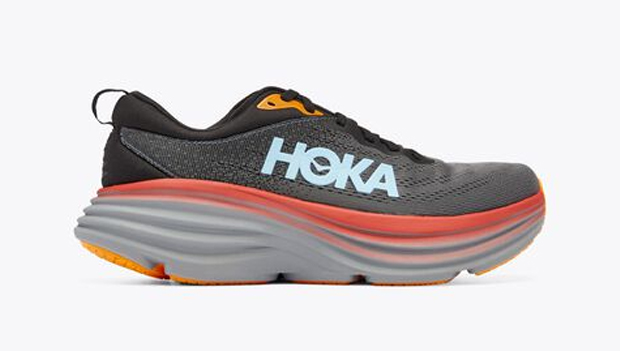
SPECS
- Best for: Runners looking for a super-cushioned neutral trainer
- Weight: 10.8 oz.
- Materials: Plush mesh upper
- Cushioning: "Ultralight" EVA foam
- Heel-to-toe drop: 4mm
Remember when minimalist running shoes led many runners into super lightweight, thinly cushioned shoes? These types of shoes often weighed less than six ounces so it’s no surprise that during this trend an outbreak of injuries occurred among runners. Hoka—incorporating maximum levels of cushioning—helped many of us return from injury and got us back into putting in steady mileage on the roads, making it our pick for the best cushioned running shoe for men.
Now in its 8th edition, the Hoka Bondi 8—with Hoka's trademark maximalist cushioning and rocker-style shape—has been tweaked with lighter foam material and increased rearfoot stability. That means you get all the cushion and support you need for long runs minus the extra weight.
What We Like
- Great long run/recovery run shoe
- Excellent road shoe, particularly for marathon
- Plush, cozy fit and feel
What We Don't Like
- Lacks the responsiveness you may want for speed or tempo training
- The relatively narrow fit may not work for wide-footed runners
Best Road Running Shoes for Men - ON Cloudrunner
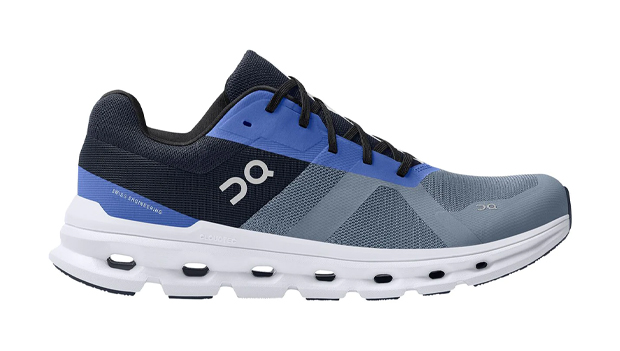
SPECS
- Best for: Running on pavement
- Weight: 10.6 oz.
- Materials: Breathable mesh upper from recycled materials
- Cushioning: Lightweight, "Zero Gravity" foam
- Heel-to-toe drop: 9mm
The eye-catching aspect of ON running shoes tends to be the unique geometry of the midsole, an accordion-like structure of foam designed to cushion using both vertical and horizontal compression. ON's neutral Cloudrunner cushioning is especially robust, making it an excellent choice if you do all or most of your running on pavement.
But, the most immediate thing you notice in lacing up a pair of ON's Cloudrunners is the feel. The upper materials (much of it made from recycled materials) provides a cushioned feel when you slip the shoe on and lace it up. We also like that the ON Cloudrunner offers a wide version, making the luxurious feel and supreme cushioning available to a wide range of foot shapes.
What We Like
- Luxurious fit and feel
- Ample cushioning ideal for running on roads
- Significant amount of heel-to-toe drop if you need substantial support
What We Don't Like
- Advanced runners might be annoyed at the bulk of the shoe
- Minimal stability
Best Running Shoes for Heavy Men - adidas Ultraboost 22
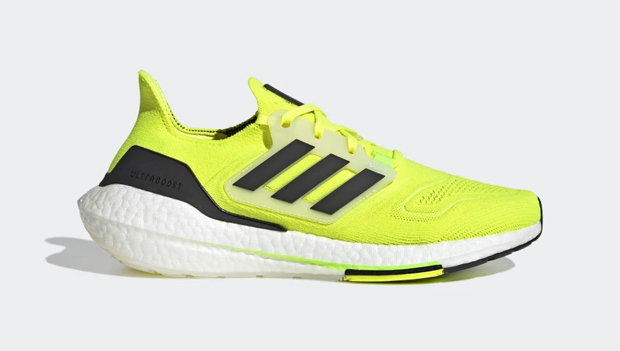
SPECS
- Best for: Heavier runners or high-mileage runners looking for durable cushioning
- Weight: 11.80 oz.
- Materials: Primarily recycled plastics and polyester
- Cushioning: Polyurethane
- Heel-to-toe drop: 10mm
One encouraging trend in running shoe technology is the use of recycled materials in the production. And the adidas Ultraboost 22 is an exceptional example, making use of plastic waste recovered from the ocean. The upper, in fact, is made from a combination of plastic scooped up from the ocean and beaches, in addition to recycled polyester.
The Ultraboost 22 is a massive shoe, making it an excellent pick for the heavier runner who might crush the midsole foam of a lightweight trainer. But, whether you’re a heavier runner or not, the robust design of the Ultraboost—and the use of polyurethane in Boost cushioning—offers more durability. The shock absorption powers of the shoe are less likely to wane as quickly as most other running shoes on the market.
What We Like
- Polyurethane midsole has excellent cushioning lifespan
- Heel-to-toe drop and sheer amount of cushion good for heavier, beginning runners
- Built with recycled materials
What We Don't Like
- On the clunky side in terms of responsiveness
- Relatively heavy shoe
Best Trail Running Shoes for Men Overall - Nike Wildhorse 7
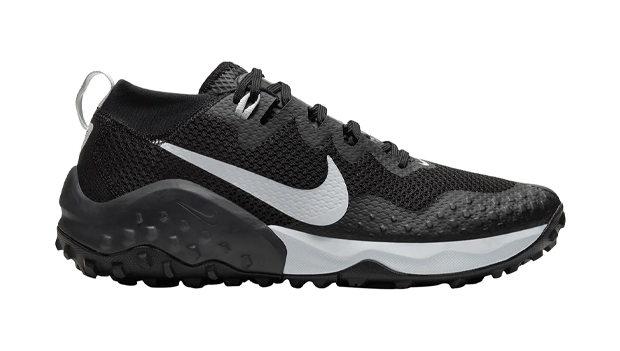
SPECS
- Best for: Off-road and trail running
- Weight: 11.1 oz.
- Materials: Breathable mesh upper
- Cushioning: Lightweight foam
- Heel-to-toe drop: 8mm
The key design element of the Wildhorse is that the compression-molded midsole wraps upward around the rear of the foot. The idea is to provide a dose of stabilization when you're off-road which is exactly what trail runners need.
We like that there’s still a solid amount of forefoot cushioning (14.4 mm worth), meaning that the Wildhorse gives you a nice ride both on hard and soft trails. Another trail-specific feature of the Nike Wildhorse is the outsole: A durable rubber with a set of grippy lugs that wrap upward on the toe box.
What We Like
- Great tread for fire roads and mild-to-moderate trail
- Moderate heel-to-toe drop bolsters stability on the trail
- Breathable upper
What We Don't Like
- Advanced runners might crave more stability on severely technical terrain
- Toe box may be too wide for narrow-footed trail runners
Best Running Shoes for Wide Feet Men - Brooks Ghost 14 Running Shoes
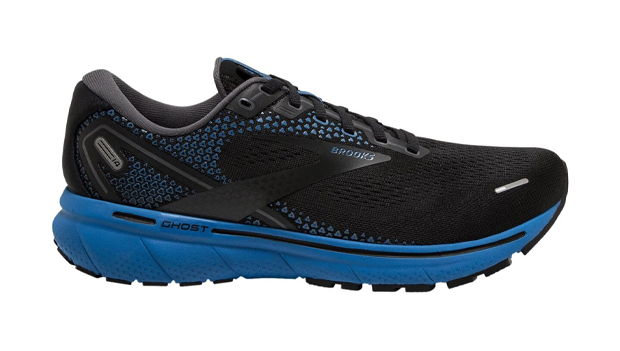
SPECS
- Best for: Road running, long runs, and recovery runs
- Weight: 9.9 oz.
- Materials: Mesh upper
- Cushioning: EVA foam cushioning tuned for durability
- Heel-to-toe drop: 14mm
I first tried the Brooks Ghost when recovering from an Achilles tendon strain in hopes that the 14 millimeter drop would provide support. I’m happy to report that it did what was expected, if not more. The midsole foam—engineered toward a balance between cushion and durability—continued to provide shock absorption after months of use.
The ample drop can be an especially good starting point if you're brand new to running and you're going through a phase of adapting your connective tissue to pounding on the pavement. Additionally, the upper materials are designed with a kind of stretch reflex that offers a snug fit to a variety of foot widths—a feature that benefits the shoes feel and responsiveness.
What We Like
- Upper technology provides snug fit
- Ample, lightweight cushion for the road
- Built with large percentage of recycled materials
What We Don't Like
- Advanced runners may want a lower heel-to-toe ratio
- Neutral shoe that may not suit some runner’s stability needs
Best Men's Running Shoes for Flat Feet - Hoka Tecton x
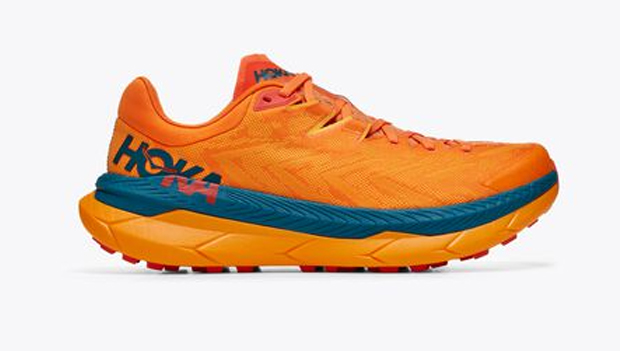
SPECS
- Best for: Fast trail running (and racing), particular runners with flat feet
- Weight: 8.5 oz.
- Materials: Mesh upper and Vibram outsole
- Cushioning: Lightweight foam
- Heel-to-toe drop: 5mm
The Hoka Tecton x is a streamlined off-road shoe designed for letting it rip on the trail. The minimal heel-to-toe drop and carbon plate insert works well if you have a flatter foot, whether you're running on the trail or the road.
The outsole is definitely meant for high-speed traction: The Vibram "Megagrip" has four millimeter lugs, something you don't usually see in such a light shoe.
What We Like
- A lightweight trainer designed for the trail
- Well-cushioned
- Low-profile with torsional rigidity proved by carbon fiber plates
What We Don't Like
- Expensive
- Not as plush feeling as other Hoka models
FAQs About Running Shoes for Men
How should men's running shoes fit?
The sweet spot for fit is a shoe that shrink-wraps around your foot in a pleasant way: Snug so that it feels sock-like but not so snug that you feel pressure on the sides or top of your foot. And while you don't want it to be uncomfortably tight, one thing you definitely don't want is to be swimming in the shoe and sliding around. That being said, allow a little bit of breathing room in the toe box, so that on long runs (when the foot swells), you don't end up losing toenails.
How often should I replace my running shoes?
The typical recommendation is between 300 and 600 miles of running, but individual variation plays a huge part in figuring out how often to replace your shoes. Your weight, weekly mileage, and how well your body is adapted to running all affect the lifespan of your running shoes. One way to judge how well your shoes are holding up is to buy a second pair and after a month or so of consistent training, compare how the old shoes feel against the new shoes. If you tend to get injured easily, you'll want to replace shoes sooner rather than later.
Are running shoes worth it?
Good running shoes are definitely worth the investment if you're serious about being a runner. But remember they can only do so much when it comes to injury prevention and performance. Training smart and adding strength and flexibility workouts to your weekly schedule—combined with good running shoes—are your best bet toward getting the most out of the sport.
About the Author

T.J. is a five-time Ironman athlete and marathon runner. T.J. is also the New York Times bestselling author of Unbreakable Runner and the former editor-in-chief of Triathlete Magazine. His writing has appeared in Triathlete, Competitor, Runner’s World, Spartan, and Outside.
Get ACTIVE on the Go


Couch to 5K®
The best way to get new runners off the couch and across the finish line of their first 5K.
Available for iOS | Android

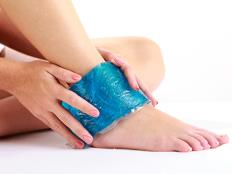
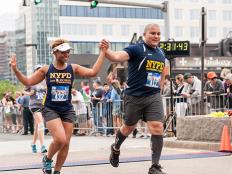



Discuss This Article